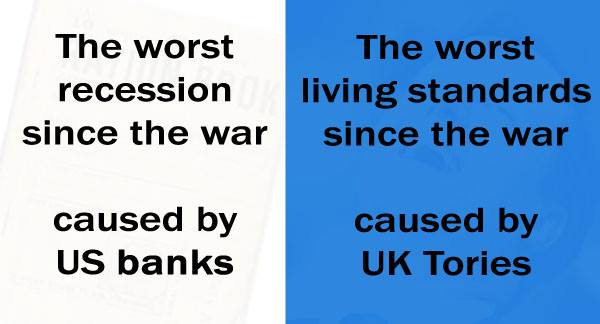
We ought to be very concerned about the government’s declaration that they intend to withdraw from the European Convention on Human Rights, (ECHR) and to repeal our own Human Rights Act, (HRA). One has to wonder what Cameron’s discomfort with the HRA is. The Act, after all, goes towards protecting the most vulnerable citizens from neglect of duty and abuse of power. The rights protected by the HRA are drawn from the 1950 European Convention on Human Rights, which was a way of ensuring that we never again witness the full horrors of the second world war, and overwhelmingly, one of the greatest stains on the conscience of humanity – the Holocaust.
Human Rights establish a simple set of minimum standards of decency for humankind to hold onto for the future. The European Convention on Human Rights and Fundamental Freedoms was drafted as a lasting legacy of the struggle against fascism and totalitarianism, as well as the atrocities of world war 2.
What kind of government would want those basic protections for citizens overturned?
One that doesn’t value or wish to uphold the universal protection of its citizens. From the State.
Last month, a new report, Dignity and Opportunity for All: Securing the Rights of Disabled People in the Austerity Era – Jane Young is the lead author – exposed the Coalition’s failure to meet its international human rights obligations under both the UN Convention on the Rights of People with Disabilities (UNCRPD) and the International Covenant on Economic, Social and Cultural Rights (ICESCR).
The report – also published by the Just Fair Coalition, a consortium of 80 national charities including Amnesty International, Save the Children, and Oxfam, says the UK is in clear breach of its legal obligations. Support structures for many disabled people have disappeared or are under threat as local authorities cut social care budgets, while cuts to social security will leave many disabled people without lifeline support for daily living.
Jane Campbell, a cross-bench peer who is disabled herself, said: “It is both extremely worrying and deeply sad that the UK – for so long regarded as an international leader in protecting and promoting disabled people’s rights – now risks sleepwalking towards the status of a systematic violator of these same rights.”
The UK government seems to be the first to face such a high-level international inquiry, initiated by the United Nations Committee because of “grave or systemic violations” of the rights of disabled people. That ought to be a source of shame for the Coalition, especially considering that this country was once considered a beacon of human rights, we are (supposedly) a first-world liberal democracy, and a very wealthy nation, yet our government behave like tyrants towards the poorest and some of the most vulnerable citizens of the UK. As disability specialist, campaigner and first-class human rights activist, Samuel Miller says: “Britain is [now] a retrograde society and a flagrant violator of human rights—especially the rights of the sick and disabled”.
It’s because of the sterling work of people such as Mr Miller that the UN have been made aware of our dire situation, here in the UK. Many of us have contacted the UN and made submissions, detailing the detrimental impacts that punitive Tory policies such as the bedroom tax, other welfare “reforms” (cuts), including the increasing use of extremely punitive welfare sanctions which leave people without the means to meet their most basic survival needs, the draconian Work Capability Assessment, brutal Tory targets for reducing spending and local authority cuts, for example, are having on ill and disabled people.
This is a government who refuse to undertake a cumulative impact assessment of their “reforms” and also continue to dismiss any evidence provided that challenges their own glib and deceitful account as “anecdotal” or “scaremongering”. Yet we are expected to regard Tory soundbites such as the “culture of entitlement” and the “something for nothing culture” which are ideologically motivated rather than resting on some sort of empirical evidence. The Tories believe that their opinions alone somehow justify the cruel removal of people’s lifeline benefits and support.
There’s more than one issue here, though it’s plain that the government have no intention of addressing any of the terrible consequences of their draconian policies, and use denial and stigmatising others to deflect attention from their aims. I am reminded of Techniques of Neutralisation – a well known collection of tactics used historically to justify prejudiced views, discriminatory and oppressive policies and despotic actions.
Another related and important issue is that people’s qualitative experiences should matter to any decent democratic government, but the Coalition is far more concerned with its persistent attempts at DISCREDITING those experiences, (such attempts to invalidate and exclude the narrative of experiences of previously and presently marginalised people is a hallmark of the oppressive, supremacist condescension of historically powerful and privileged groups) – denying their victims a voice and remedy. We know that this is not a democratic government that serves its citizens and reflects their needs, equally or otherwise.
Thanks to the sterling work of Dr Simon J Duffy, from the Centre for Welfare Reform, among others, we know that the austerity measures in the UK have disproportionately affected those people with disabilities and their carers. Dr Duffy’s work on the impact of the austerity cuts shows us that:
- People in poverty are targeted 5 times more than most citizens
- Disabled people are targeted 9 times more than most citizens
- People needing social care are targeted 19 times more than most citizens
Yet, this government claims a cumulative impact assessment is “too difficult and costly”, I suggest that they use their considerable publicly donated, tax-collected wealth to fund the work of the Centre for Welfare Reform, who managed to undertake this work without hitting the obstacles the government claims it has. This said, perhaps the findings are the real obstacle that the government are concerned about. Because those findings are damning, and tell us that the welfare “reforms” are NOT “fair” as claimed, and are causing harm, distress, hardships and sometimes, death. The grossly punitive, draconian “reforms” need to be repealed.
The UN Committee has the power to launch an inquiry if it receives “reliable information” that violations have been committed, and as the Labour Government signed up to the protocol in 2009 – the UNCRPD and the international covenant on economic, social and cultural rights – it is legally binding. Many of us have used the Optional Protocol to the Convention on the Rights of Persons with Disabilities to send communication and make submissions since 2012.
Austerity measures and welfare “reforms” such as the bedroom tax (which is in itself established by the UN as being a contravention of human rights law) mean the rights of disabled people to independent living, work, and adequate social security have been seriously undermined, causing significant hardship and harm, quite often leading to tragic consequences.
Such investigations are necessarily conducted “confidentially”, so the UNCRPD has formally refused to confirm or deny that the UK is being investigated. However, a recording has emerged (one hour and twenty five minutes long, watch from one hour and four minutes) of a former CRPD member seemingly revealing that the inquiry has been launched.
Professor Gabor Gombos, who is the co-founder of Voice of Soul, Hungary’s first organisation for ex-users and survivors of Mental Health Institutions, and co-chair of the World Network of Users and Survivors of Psychiatry, can be heard informing the audience that CRPD has “started its first inquiry procedure against the United Kingdom”.
He informs the Sixth International Disability Law Summer School at the National University of Ireland in Galway, June, that inquiries are only used where there are suspicions of “grave” violations of human rights. He says: “Where the issue has been raised and the government did not really make effective actions to fix the situation – it is a very high threshold thing – the violations should really be grave and very systemic.”
Earlier this year, the level of UK benefits paid in pensions, jobseeker’s allowance and incapacity benefits was deemed “manifestly inadequate” because it falls below 40% of the median income of European states, by the Council of Europe in Strasbourg.
The finding in an annual review of the UK’s adherence to the council’s European social charter is likely to provoke a fresh dispute between the government and European legal structures. Iain Duncan Smith, the work and pensions secretary, dismissed it as “lunacy”.
Not an open, accountable minister, or government, then.
The Council of Europe, which has 47 member states, said the conclusions were legally binding in the same way that judgements relating to the European Convention on Human Rights had to be applied by member states.
Aoife Nolan, professor of International Human Rights Law at the University of Nottingham and a trustee of Just Fair said government policies were compromising disabled people’s human rights.
“Not only do these policies cause significant hardship and anxiety, but they also amount to impermissible backward steps in relation to disabled people’s human rights, contrary to the UN human rights framework.”
The report was submitted to the United Nations, which, as I’ve previously outlined in earlier articles here, is in the process of reviewing UK compliance with its obligations to the rights of disabled people.
Last year, Amnesty International condemned the erosion of human rights of disabled people in UK, and the Joint Parliamentary Committee on Human Rights conducted an inquiry into the UK Government’s implementation of Article 19 of the United Nations Convention on the Rights of Persons with Disabilities – the right to live independently and to be included in the community. The inquiry, which began in 2011, has received evidence from over 300 witnesses.
The inquiry highlighted just how little awareness, understanding and employment of the Convention there is by the Tory-led government. Very few of the witnesses made any specific reference to the Convention in their presented evidence, despite the inquiry being conducted by the Parliamentary Human Rights Committee, with the terms of reference clearly framing the inquiry as being about Article 19 of the UNCRPD.
“This finding is of international importance”, said Oliver Lewis, MDAC Executive Director, “Our experience is that some Governments are of the view that the CRPD is nothing more than a policy nicety, rather than a treaty which sets out legal obligations which governments must fulfil.”
The report is particularly critical of the Minister for Disabled People (Maria Miller, at the time) who told the Committee that the CRPD was “soft law”. The Committee criticised this as “indicative of an approach to the treaty which regards the rights it protects as being of less normative force than those contained in other human rights instruments.” (See the full report.) The Committee’s view is that the CRPD is hard law, not soft law.
Quite properly so. The whole point of human rights legislation is that it is universally applied, regardless of characteristics, preferences or belonging to a specific community or social group. The Tories seem to believe that poor people, disabled people and those with mental and physical illness should enjoy fewer rights than others.
Dr Hywel Francis MP, Chair of the Committee, said: “We are concerned to learn that the right of disabled people to independent living may be at risk through the cumulative impact of current reforms. Even though the UK ratified the UNCPRD in 2009 with cross-party support, the Government is unable to demonstrate that sufficient regard has been paid to the Convention in the development of policy with direct relevance to the lives of disabled people. The right to independent living in UK law may need to be strengthened further, and we call on the Government and other interested organisations to consider the need for a free-standing right to independent living in UK law.”
“The Government is meant to include disabled people in making sure people have their human rights upheld. We are concerned that a part of the Law on treating people equally and fairly (Equality Act section 149) does not say any more that disabled people should be involved. This is a step backwards.”
In other words, the Tory-led Coalition has quietly removed this part of the Equality Act.
The budget of the Equality and Human Rights Commission (EHRC), which was established by the Labour Party when they were drafting this flagship policy, is being reduced by over 60%, its staffing cut by 72%, and its powers restricted by the Coalition. Provisions that are being repealed by the Enterprise and Regulatory Reform (ERR) Bill include the duty on public authorities to have due regard to the need to reduce socioeconomic inequalities.
Savage Legal aid cuts from April 2013 have also contributed significantly to creating further barriers to ensuring Equal Rights law protect us, and the Tory-driven Legal Aid Bill also contravenes our right to a fair trial under Article 6(1) of the European Convention on Human Rights.
This is not a coincidental multiple policy timeline, but rather a very coordinated political attack on potential legal challenges at a time when Tory-led severe and devastating multiple welfare and provision cuts have affected disabled people so disproportionately. The changes, which came into effect in April, will hit “the same group of disabled people over and over again”.
Our political freedoms and human rights must not be subservient to Tory notions of ‘economic success’. Democracy is not about the private accumulation of wealth of a few millionaires at the expense of others. It is about the wise use of the collective wealth – pubic funds – for the common good of the public – that must extend to include ALL of our citizens. And a decent, civilised, democratic society supports its vulnerable members and upholds universal human rights.
We need to ask why our government refuses to instigate or agree an inquiry into the substantial rise in deaths among ill and disabled people, as these deaths are quite clearly a correlated consequence of this government’s policies.
What kind of government uses the media to scapegoat and stigmatise ill and disabled people, by lying and inventing statistics to “justify” the persecution of our most vulnerable citizens, and the withdrawal of their crucial lifelines and support?
One that does not value those lives, or regard them as having an equal worth with others.

I’m adding this comment from Samuel Miller, as it highlights his ongoing, excellent, valuable and much appreciated work with the United Nations on our behalf, which is a most welcomed addition to our own ongoing submissions of evidence over the past couple of years:
“A superlative piece, which I will bring to the attention of senior UN officials. Ahead of the September meeting of the Human Rights Council (see third paragraph of :-http://mydisabilitystudiesblackboard.blogspot.ca/2014/08/an-inopportune-time.html), I will shortly submit an inquiry request to the CRPD and Human Rights Council, petitioning them to open an investigation into Britain’s benefit-sanctioning regime. (At the request of Jorge Araya, UNCRPD Secretary, I am completing a bibliography of media articles on this subject, with particular focus on inappropriate sanctions.)
You already know my views on this matter: http://twishort.com/1RVfc.
My bibliographic assignment for the UNCRPD Secretary might be an indication that the UN has already opened an investigation into Britain’s benefit-sanctioning regime, but for the sake of certainty I’ll make that request myself.”
And further: See my letter to High Commissioner, Navi Pillay, below. I included your superb article in my letter, Sue.
Subject: There is an urgent need for a UN investigation into the United Kingdom’s benefit-sanctioning regime
Samuel Miller
Attachments3:58 PM
High Commissioner Navi Pillay
Office of the United Nations High Commissioner for Human Rights (OHCHR)
Palais Wilson
52 rue des Pâquis
CH-1201 Geneva, Switzerland.
Dear Ms. Pillay,
I am a 57-year-old Disability Studies specialist and disability activist from Montreal, Canada who has been communicating frequently and voluntarily, since January 2012, to senior United Nations officials, on the welfare crisis for the United Kingdom’s sick and disabled.
(See attached, and the following:
http://www.twitlonger.com/show/n_1rp0uui,
http://www.twitlonger.com/show/n_1rtnc63,
http://www.twitlonger.com/show/n_1rtvfk5 ).
It is my understanding that a 22-page letter, pointing out that cuts to social security benefits introduced by Iain Duncan Smith and enforced by his Department for Work and Pensions on behalf of the Coalition government may constitute a breach of the UK’s international treaty obligations to the poor, will also be discussed at a meeting of the UN Human Rights Council in New York, in September. It is signed by Raquel Rolnik, the former UN special rapporteur on adequate housing; Magdalena Sepúlveda Carmona, the former UN special rapporteur on extreme poverty; and Olivier De Schutter, the former UN special rapporteur on the right to food.
Could you please add, as an addendum to that letter, my partial bibliography on Britain’s benefit-sanctioning regime, which is attached below in PDF format. My views can be found on page two; I am extremely concerned about the British government’s soaring use of benefit sanctions, and the evidence from MPs and the Work & Pensions Committee, which provides oversight of the Department for Work and Pensions, is especially compelling and strongly suggests that the government is stitching-up benefit claimants and is involved in a cover-up of that fact. The refusal of the government to agree to the Work & Pensions Committee’s request for an independent inquiry into this matter only compounds suspicion.
In closing, I would be most appreciative if the Human Rights Council and the OHCHR would open an investigation into this matter. This article (https://kittysjones.wordpress.com/2014/08/16/uk-becomes-the-first-country-to-face-a-un-inquiry-into-disability-rights-violations/) is very worthy of your—and their—attention, as well.
I wish to congratulate you on your tenure as High Commissioner, and wish you every success in your future endeavors.
Warm regards
Samuel Miller

Pictures courtesy of Robert Livingstone

The last Labour government introduced a host of measures to strengthen the rights of our most vulnerable groups – in particular they protected the rights of disabled people. They formulated the Human Rights Act 1998. They passed the Disability Discrimination Act 2005, introduced the Equality Act 2010, formed the Equality and Human Rights Commission, and, in 2009, the Labour government signed the United Nations convention on the rights of persons with disabilities.
The few successful cases we have seen brought against the Tories are down to these Labour laws. We mustn’t lose sight of that. And I’ve every faith that a Labour government will address the gross injustices extended by the draconian of this government, using the existing laws, and their currently proposed policy of prosecuting people for hate speech against the vulnerable.
I don’t make any money from my work and I am not funded. I am disabled because of illness and struggle to get by. But you can help me continue to research and write informative, insightful and independent articles, and to provide support to others, by making a donation. The smallest amount is much appreciated – thank you.















